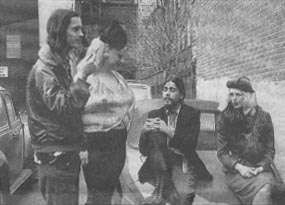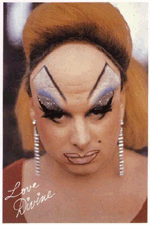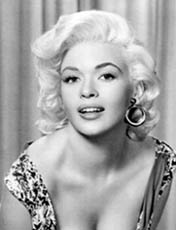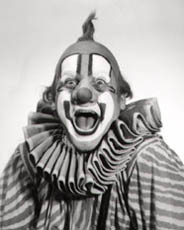How A Fan of the Wicked Witch Became a Succès de Scandale
By Stephen Holden, New York Times March 31, 2000
 When
John Waters was a little boy, his mother recalls in Steve Yeager's documentary
film, "Divine Trash," it wasn't the heroes of children's literature but
the villains who attracted him. The Wicked Witch of the West and Captain
Hook were among his fantasy idols. By the age of 10, under the spell of
the movie "Lili" and of "Howdy Doody," he was staging his own puppet shows
in his neighborhood and earning $25 a week, not a small sum for a boy that
age.
When
John Waters was a little boy, his mother recalls in Steve Yeager's documentary
film, "Divine Trash," it wasn't the heroes of children's literature but
the villains who attracted him. The Wicked Witch of the West and Captain
Hook were among his fantasy idols. By the age of 10, under the spell of
the movie "Lili" and of "Howdy Doody," he was staging his own puppet shows
in his neighborhood and earning $25 a week, not a small sum for a boy that
age. These influences and many others, including the B-movies he used to watch through binoculars from a hill overlooking a drive-in theater and the underground films of Andy Warhol, Kenneth Anger and the Kuchar Brothers, helped shape a directing career that has made Mr. Waters both the pride and the scandal of his native Baltimore. His informal repertory company was drawn from a group of local "post-Beat, pre-hippie" outsiders whose collective sensibility was fueled by amphetamines and pot.
Mr. Yeager's fine and fascinating biography of Mr. Waters pays scant attention to his Hollywood career. The movie ... follows his work through the making and marketing of his 1972 underground succès de scandale, "Pink Flamingos," which made film history with its notorious scene of Divine (a k a Glenn Milstead) ingesting dog feces. As Mr. Waters demurely remembers that shattering moment: "It was a magic day in our happy young lives."
"Divine Trash" reminds us that successful film-making careers don't evolve haphazardly, no matter how bizarre the work. From his days as a neighborhood puppeteer, Mr. Waters was an extremely focused, well-organized and hard-working showman who instinctively understood the importance of promotion and marketing. Even in a 1972 television interview that is threaded through the movie, he displays a cool-headed sense of who he is, and where he wants to go.
Throughout the movie, Mr. Waters also evinces the brass-tacks practicality of someone who learned film making by the seat of his pants. Pete Garey, who ran the Quality Film Labs, which processed his early movies, is credited with being the closest thing in his life to a film school. Although Mr. Waters studied film at New York University "for five minutes," he admits that he was more interested in watching "Olga's House of Shame" than "Potemkin."
Mr. Waters is highly articulate and endlessly quotable. He describes the appearance of Divine, the hefty drag queen who was his biggest star, as a conscious cross between his favorite 50's film star, Jayne Mansfield, and Claribel, the seltzer-bottle wielding clown on "Howdy Doody." More than anything else, he wanted Divine to scare people.
|
|
 |
The
movie takes a short detour to examine the life and influence on drag culture
of the larger-than-life Divine, who died in 1988. "He was my Elizabeth
Taylor," recalls Mr. Waters. "He was an actor who started his career as
a homicidal maniac and ended it playing a loving mother, which is a pretty
good stretch, especially when you're a 300-pound man."
The last section of "Divine Trash" shows actual rehearsals for "Pink Flamingos,"
including the dog-feces moment without which the movie probably wouldn't
have become the sensation that it did. Mr. Waters is characteristically
blasé about it all. He characterized the film, in which two transcendently
weird households compete for the title of the filthiest family alive,
as "a kindergarten movie." And in a way he's right.
 +
+ =
=